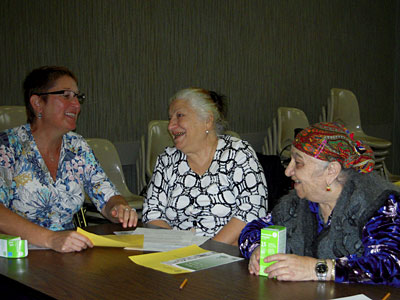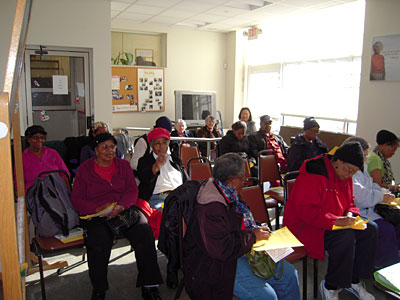Workshops teach NYC residents how to 'live greener'
By Elisabeth Rosen


Residents of Spring Creek Towers in Brooklyn don't typically talk about how much energy a washing machine sucks up or how much waste a dripping faucet generates. Many come from a generation where sustainability and energy efficiency were never addressed; many are also immigrants, for whom the intricacies of the English language often prove challenging to comprehend.
But after several workshops organized by Cornell University Cooperative Extension -- New York City (CUCE-NYC), the residents of the apartment complex started buzzing about how much energy everyday objects can consume.
"Sustainable living to some may sound like an ivory tower ideal, but with a little bit of push, people can realize it really applies to their daily lifestyles," said Richard Mai '12, who worked as an intern on the project last summer and this winter. "The residents who attended were enthusiastic and tended to share their workshop experience with others."
"The greatest challenge is not just to inform residents on how to conserve energy or live healthier, but to encourage residents to actually take action," Mai said.Since January, CUCE-NYC educators have been conducting workshops on energy efficiency and conservation, healthy homes and sustainable living; their goal is to reach 900 residents this year in some 30 affordable housing residential buildings in the New York City area that have recently undergone energy savings retrofits. Improvements have included new refrigerators and boiler heating units, energy efficient lighting fixtures that use motion sensors and new carbon monoxide detector alarms. Mai and other sustainability educators teach people to shut off electronics when not in use and to eat more whole grains, for example.
Once residents have information that is new to them, their motivations change and they are more likely to act on it. Many participants said that they intended to change their habits, said Gretchen Ferenz, program and resource development specialist at CUCE-NYC, who leads this program and many of the workshops. A "large majority" of participants, for example, have vowed to purge their shelves of chemical air fresheners and aerosols now that they've learned that such products contain toxic chemicals.
But the fact that English is a second language for some has made it particularly challenging for Ferenz to explain the finer points of energy efficiency or impacts on human health, for example.
"I find myself telling personal stories to get a point across, such as my husband's preference to hand-wash dishes rather than use the energy-efficient dishwasher," Ferenz said. "After using some clever demonstrations, participants nod in gratification."
Despite the language barrier, though, Ferenz said that residents have been eager to learn. Participants often help each other translate difficult concepts into more familiar languages.
"In an early workshop, an elderly immigrant from Russia was sitting in the front row of seats. As soon as I started presenting, the woman sitting aside her began translating almost every word in Russian for her benefit," Ferenz said.
Even the oldest participants, who may have been recycling and eating from gardens for years but not aware of other "green living" strategies, took on the energy efficiency and healthy home suggestions with enthusiasm.
"The seniors attending the workshop were very attentive and emphasized that they found it interesting and easy to understand," said Barbara Chocky, executive director of Spring Creek Senior Partners, which provides support services to Spring Creek.
Workshop funding is provided, in part, by the Community Environmental Center, a local nonprofit that received federal weatherization and energy efficiency funding support. RelightNY (co-founded by Avery Hairston '14) and the EnergySmart Communities/Pratt Center for Community Development donated compact fluorescent light bulbs for participants.
Elisabeth Rosen '12 is a writer intern for the Cornell Chronicle.
Get Cornell news delivered right to your inbox.
Subscribe